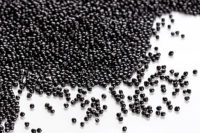
The engineers were given the assignment to recommend the most cost-effective solution without having to replace or modify the existing connectors. After investigating the situation, they concluded that a thread-locking compound would be the best choice because it would have the least impact on normal maintenance and would subject the connectors to the least potential damage. The compound they selected was ND Vibra-Tite®, from ND Industries, Inc., Clawson, Mich. This viscous resin has excellent cold-flow properties but dries to the touch in seconds and does not require that parts be pre-cleaned.
The product was selected because the specific blend of acrylic compounds provided a flexible consistency that never gets dry, allowing a fastener coated with it to be easily adjusted, removed and re-used many times. The material is thick, resilient and acts as a damping compound that enables the fastener to absorb vibration, eliminating the possibility of the fastener ever “walking out” of the thread path.
Vibration testing under varying temperature conditions was performed on three different cables to first characterize the loosening of the connectors and secondly to evaluate the performance of the ND Vibra-Tite compound. During testing, it was discovered that the connector backshells were produced by two different manufacturers. The defective backshells were an old design that had since been improved, and subsequent vibration tests proved that the new design did not loosen under normal operating conditions.
The Vibra-Tite material was tested on special cable-vibration shaker test equipment. No loosening occurred in the connector. Both a narrow and wide strip of Vibra-Tite were applied perpendicular to the threads. The wider strip resulted in a higher inductive coupling (reduced shielding effectiveness) than the narrow strip.
As a result of the testing, a repair procedure was recommended for the loose backshells that included applying a thin strip of the ND Vibra-Tite locking/sealing coating to the threads of the backshells’ connectors. The product was already in the military inventory of approved specifications.
For more information on ND Vibra-Tite, contact ND Industries, Inc., 1000 North Crooks Rd., Clawson, MI 48017; phone 248-288-0000; fax 248-288-0022; e-mail ndinfo@ndindustries.com.
